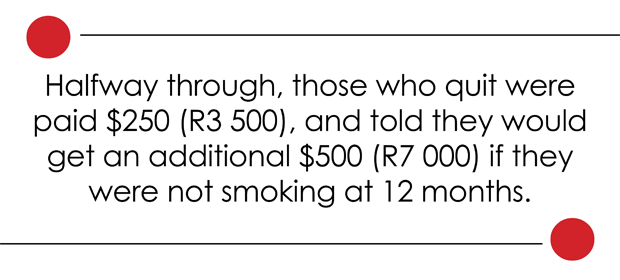
South Africa is a nation of smokers. According to recent statistics in the South African National Health and Nutrition Examination Survey, 16.4% of South Africans were smokers in 2012, with so much as 21% of children between grades eight and 11 lighting up.
But it seems that a new study might be on to something. Smokers who are offered cash incentives are far more likely to give up cigarettes than those who are simply offered tips on how to quit, said a recent US study.
The poor smoke more
The approach could offer ways to cut the number of smokers, which has remained steady at about one-fifth of the US population in recent years, according to the report in the Journal of the American Medical Association (JAMA) Internal Medicine.
The rate among the poor is even higher. 26% of smokers in the US in 2015 were below the poverty line, compared to 14% of smokers at or above the poverty line, according to background information in the article.
A previous Health24 article reports that according to the latest national statistics, 16.4% of South Africans were smokers in 2012. This is a significant drop from 32% in 1993.
What the study entailed
The randomised clinical trial included 352 people in Boston, Massachusetts.
Participants were recruited from hospital waiting rooms. Those entering the study all smoked more than 10 cigarettes per day and wanted to quit. Most were African-American women.
Some were given a brochure and a list of community resources available to help people quit smoking.
Others received the same resource list, along with extra counselling sessions on how to quit from "patient navigators", and were also told they would get a cash payment if they managed to give up cigarettes.
Participants were not told how much they would get paid for quitting when they entered the year-long study.
Halfway through, those who quit were paid $250 (R3 500), and told they would get an additional $500 (R7 000) if they were not smoking at 12 months.
How many have quit?
Nearly 10% of the incentive group had quit by six months, compared to less than 1% of those offered a brochure.
Those who had not quit by six months were given a chance to keep trying in exchange for a payment.
"After 12 months, 12% of the intervention group quit smoking, while 2% of the control group had quit," said the study.
Urine and saliva tests confirmed whether smokers had indeed quit or not.
Lead author Karen Lasser, associate professor of medicine at Boston University School of Medicine, said the study shows a multi-faceted approach that employs incentives works best.
"Most of the participants who quit smoking utilised patient navigation, but it's unclear whether navigation alone would achieve the rates of smoking cessation we observed," she said.
Image credit: iStock




 Publications
Publications
 Partners
Partners














